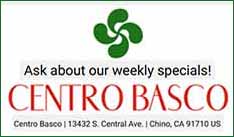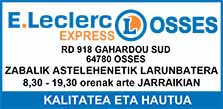
Photo courtesy of the Douglas County Historical Society - CarsonValleyTimes.com
Sheila Gardner/Gardnerville, NV, USA. “This is our story, but there’s not a soul in this whole place who isn’t part of this story,” Robert Lekumberry said.
Photo courtesy of the Lekumberry Family Collection
Photo provided by the Douglas County Historical Society.
Long before there was a fictional Boston bar “where everybody knows your name,” Gardnerville was known for its Basque bars, food and drink, and hospitality.
Not only did everybody know your name, they spoke your language, shared your hopes and dreams as newcomers to America, and knew your family back in Basque country.
Jean Lekumberry, patriarch of the family, came to the United States in 1947 at age 22.
He worked as a sheepherder, camp tender, miner and drove a milk tanker for the Minden Co-op Creamery before acquiring the JT in 1960.
After showing a home movie of the Lekumberrys’ 1960s visit to their beautiful ancestral home in Osses, France, Marie-Louise posed the question, “Why would anybody want to leave this?”
“There were not too many options as a young man or a young woman,” she said.
“The first-born took over the farm. So, if you were not first-born, you could marry the first-born of another family, become a priest or a nun, or you could leave,” she explained.
Jean had two uncles in Argentina and one in Carson Valley. He sent letters inquiring about work to all three on the same day.
He received three positive replies, but the first he heard from was his uncle in Carson Valley, John Harronyo, so, he headed to America.
Tragically, the uncles in Argentina both died from a plague that was spread by livestock, leaving the family to wonder if the same fate would have befallen Jean.
“How he decided to come here, it was a total fluke,” Marie-Louise said.
Lekumberry flew from Paris to New York City and took the train to Reno. He walked from the station to the Santa Fe Hotel, which still operates a Basque restaurant, and waited three days for his family to pick him up to take him to Gardnerville. “Although he was thousands of miles from home, there was a little Basque world going on in the Gardnerville he arrived in,” Marie-Louise said.
Within one block were thriving Basque restaurants and boarding houses including the Overland, the East Fork, the French and the Pyrenees.
Photo courtesy of the Lekumberry Family Collection Sheepherders Jean Lekumberry and Aurelio Casaus (standing), early 1950's, Sierra Nevada Mountains
Photo courtesy of the Lekumberry Family Collection
Sheepherders Jean Lekumberry and Aurelio Casaus (standing), early 1950’s, Sierra Nevada Mountains
“It was a home away from home for the Basque sheepherders. You were meeting people you never would have met in your own little village. Even though the boarding houses were in competition, they were all really, really good friends. You owned your Basque joint, but you’d go to the one down the street and buy a round, and they’d come to yours and do the same thing. Today we call it synergy, in those days they just called it ‘really good friends,’” she said.
Home movies showed moving sheep through Markleeville, and old-school methods of castration perhaps better left to the imagination.
“I asked somebody if this was too much,” Marie-Louise said after a particularly graphic segment, “and they said, ‘Nah. It’s Gardnerville.”
Robert Lekumberry talked about the summer his father sent him to tend sheep in Markleeville with a non-English speaking sheepherder.
“After that, I knew I never wanted to be a sheepherder,” said Robert, a battalion chief who is set to retire this year after 29 years with the East Fork Fire and Paramedics district.
“And, I hate sheep,” he added.
The building which became the JT was moved from Virginia City in the late 19th century. Originally, it was the restaurant for the Gardnerville Hotel.
The JT Basque Bar and Dining Room opened Feb. 26, 1955, with owners John and Grace Jaunsaras and Jimmy and Grace Trounday who used their initials to name the bar.
At one time, Grace and John owned the Overland, the JT and the Carson Valley Country Club which they turned into a Basque restaurant.
“John and Grace were great people to our family,” Marie-Louise said. “Grace would come down and show you how to do it right.”
J.B. referred to Grace as the “forbidding chef of Carson Valley,” who taught all the Basque chefs how to cook to her exacting standards.
“When I was 17 or 18, our cook quit, and Dad said to me ‘You need to go into the kitchen.’”
Realizing he needed help, J.B. asked his father to call Grace.
“He said, ‘No. You call Grace. If I call her, she won’t come,’” J.B. recalled.
Movies of the Lekumberry kids show them growing up at the JT, playing in the bar, kicking a ball through the restaurant, riding a tricycle around the bar stools and entertaining customers.
“This was our living room,” Marie-Louise said. “If you tried to raise kids like that today, somebody would probably call Child Protective Services.
“But we had (former Sheriff) George Byers,” she said.
The legendary Sheriff Byers was a frequent customer of the JT.
“He would have probably told anybody who tried to interfere, ‘Get out of my town,’” she said.
Jean Lekumberry and his brother Pete bought the JT in 1960 when a full-course dinner was $1.50. Jean tended bar, Pete cooked, and Shirley Lekumberry was the waitress.
Marie-Louise remembers washing dishes at age 8, and working her way up to hostess for which she was paid 60 cents an hour, according to a time card she filled out in the 1970s.
Robert was paid $1.20 an hour as a waiter in 1970.
“I think there was a little wage discrimination there,” she said.
Today, she runs the bar and the front of the house, and J.B. runs the kitchen and the back.
“Lest you think it was all work and no play at the Lekumberrys, we had lemonade stands and we were in the kiddie parade,” she said.
The home movies evoked appreciative remarks from the audience, many of whom watched the Lekumberrys grow up, or were childhood playmates.
“If you were dating a Lekumberry, my dad probably would put you to work,” Robert said.
That was the case for his wife, Susie and J.B.,’s wife Lisa Giovacchini Lekumberry, who also operates Ranch No. 1, the Trimmer/Giovacchini Ranch in Genoa.
The iconic image of Jean Lekumberry in his beret, round black glasses and smoking a cigar turned into a T-shirt business for Marie-Louise and J.B.
A patron created the image on a paper napkin with a black Magic Marker.
“One day my Dad said, ‘I think my kids are making a monkey out of me,’” Marie-Louise recalled. “He didn’t think he looked like that.”
Jean loved to talk politics and keep up on current events.
“He was a Democrat when there weren’t too many in Carson Valley,” Marie-Louise said.
Jean Lekumberry died at the bar in 1993.
“After our Dad died, we could do what we wanted, and J.B. brought the kitchen and the menu to a whole new level,” Marie-Louise said.
The Lekumberrys launched a project to restore the JT to the building it was when it was moved from Virginia City. That meant putting a balcony back on the front, and extensive remodeling inside.
“We never closed, except for a week when we remodeled the kitchen, but we kept the bar open,” J.B. said.
Marie-Louise singled out the JT staff including manager Ryan Lamb whom she hired when he was only 17.
“I broke my own rule when I hired him, but I knew raw talent when I saw it,” she said.
He has been restaurant manager for 10 years, and worked for the Lekumberrys for 20 years.
“We have the greatest staff ever. We are blessed to have so many hard working and loyal employees,” she said, to a round of applause.
After the presentation, guests were invited to enjoy a Basque-style spread in the lower level of the museum.
Roger Trounday and his wife Gail drove from Reno for the event, to listen to the history of their family’s “T” contribution to JT.
“I think it was wonderful,” he said. “Everyone in here had a connection to what we were talking about.”
Helen Chappell, daughter of John and Grace Jaunsaras, said she enjoyed hearing the stories of when she was younger and seeing people she had known all her life.
Helen and her husband, Dick Chappell, ran the Carson Valley Country Club with her parents from 1969-1974 before selling it to Jesus Rey and Carlos Iribarren.
Speaking of her late husband Dick, her parents, and Jean Lekumberry, Helen said. “All the people up there (in heaven), looking down on us today, I think they would be pleased.”
It was a bittersweet afternoon for Renee Presto.
Her mother, Beatrice, died just a few days ago at age 93. Marie-Louise paid tribute to the Sario/Presto family which figures so prominently in Basque culture of the Carson Valley.
The family celebrated her life at the JT following her funeral last week at St. Gall Catholic Church.
“I grew up in all these places,” Renee said. “I know all these people, and even though I know a lot of the stories, it’s wonderful to hear them again.”
Marie-Louise said she believed her father would have been pleased with the program and the turnout.
“I think he would have been so happy to see his friends here today. He was a storyteller, and he would have been proud of my storytelling,” she said.
J.B. said the event helped remind him of the importance the JT plays in so many lives in addition to his family’s.
“I met a couple of people today who were relatives of people in some of these pictures and you start to make the connections. We’re only stewards of this place. We have seen generations come through. Maybe it’s once a year when they rent a cabin at the Lake, or they’re driving through on their way to Bridgeport. But we are part of their pilgrimage, and that’s a wonderful feeling,” J.B. said.
DETAILS
Additional information about the Basque heritage in Carson Valley is available in “From the Basque Country to the Sheep Camps of the Carson Valley, The Personal Stories of Basque Immigrants.” The book was compiled by the Mendiko Euskaldun Cluba (Mountain Basque Club) of Gardnerville and published in 2001. Copies are available at the Carson Valley Museum and Cultural Center and the Douglas County Public Library.
The Douglas County Historical Society is celebrating the 100th anniversary of the old Douglas County High School, home of the Carson Valley Museum and Cultural Center, with the Recollections Project. Graduates of the old high school, teachers or former staff are invited to share their stories for presentation at a storytelling event in September. For information, contact the historical society at 782-2555.
ON THE WEB
Douglas County Historical Society
www.HistoricNV.org
Carson Valley Times contributor Sheila Gardner is a long-time Gardnerville resident who retired in 2014 after more than 30 years at The Record-Courier. Her first meal at the JT was in early 1981 after she was hired as R-C editor. The original Record-Courier building, now home to Especially For You gift shop, shared a parking lot with the JT.



 Enviar a un amigo
Enviar a un amigo Añadir comentario
Añadir comentario








